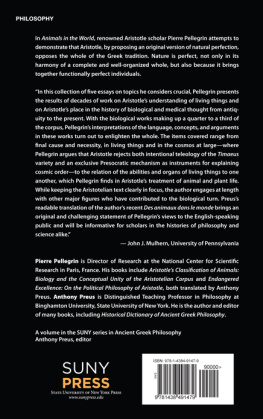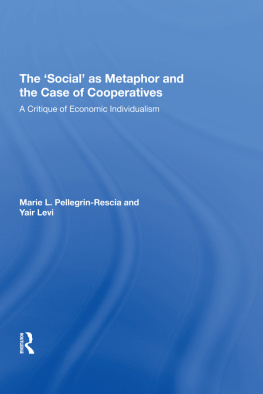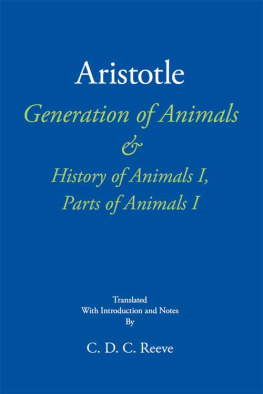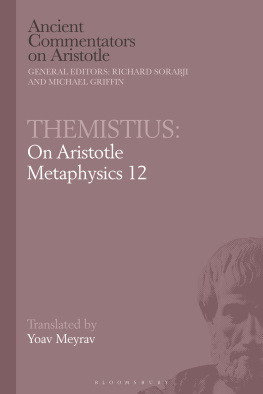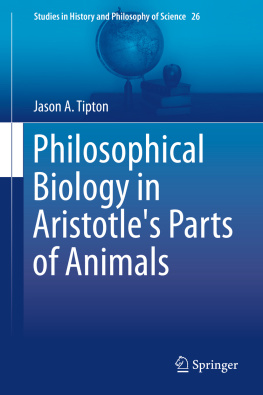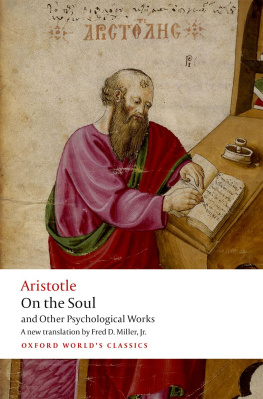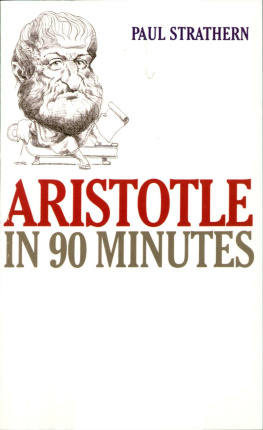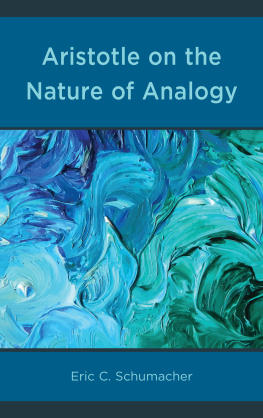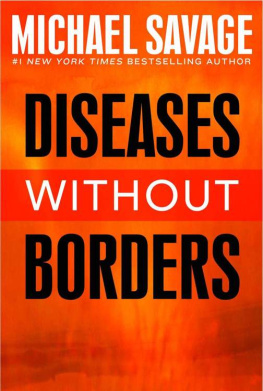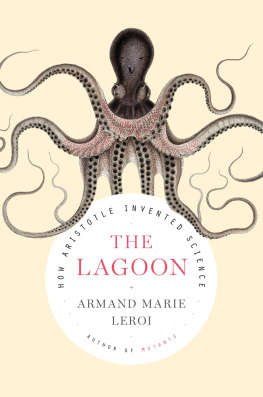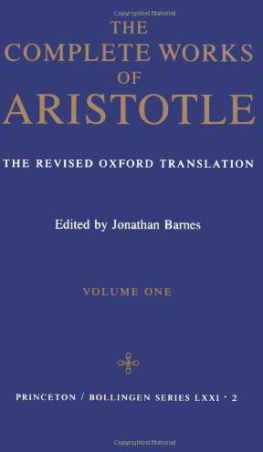Animals in the World
SUNY series in Ancient Greek Philosophy
Anthony Preus, editor
Animals in the World
Five Essays on Aristotles Biology
Pierre Pellegrin
Translated by Anthony Preus

Published by State University of New York Press, Albany
2023 State University of New York
All rights reserved
Printed in the United States of America
No part of this book may be used or reproduced in any manner whatsoever without written permission. No part of this book may be stored in a retrieval system or transmitted in any form or by any means including electronic, electrostatic, magnetic tape, mechanical, photocopying, recording, or otherwise without the prior permission in writing of the publisher.
For information, contact State University of New York Press, Albany, NY
www.sunypress.edu
Library of Congress Cataloging-in-Publication Data
Names: Pellegrin, Pierre, author. | Preus, Anthony, translator.
Title: Animals in the world : five essays on Aristotles biology / Pierre Pellegrin, Anthony Preus.
Description: Albany : State University of New York Press, [2023] | Series: SUNY series in ancient Greek philosophy | Includes bibliographical references and index.
Identifiers: LCCN 2022021019 | ISBN 9781438491479 (hardcover : alk. paper) | ISBN 9781438491486 (ebook)
Subjects: LCSH: Aristotle. Historia animalium. | ZoologyPre-Linnean works. | ZoologyPhilosophy.
Classification: LCC QL41 .P44 2023 | DDC 590dc23/eng/20220616
LC record available at https://lccn.loc.gov/2022021019
10 9 8 7 6 5 4 3 2 1
Contents
Chapter 1
Is There an Aristotelian Biology?
Chapter 2
The New Horizon of Teleology
Chapter 3
A Philosophy of Life?
Chapter 4
Diversity
Chapter 5
Animal Nature and Human Nature
Introduction
P erhaps Aristotle conceived his philosophical project as encyclopedicthat depends on how we understand the word encyclopedicbut it surely would be going too far to attribute to him a systematic vision.
That work took the place of another project, that of publishing a collection of articles, more or less revised, of some of those that I had dedicated to Aristotelian politics. Since I also had, as an editor had suggested to me, the project of bringing together articles on Aristotles biology, I wondered whether I could do for the biology what I had done for the politics. But very quickly the project seemed to me impossible: the extraordinary increase of publications on the subject, specialized analyses more and more profound and subtle that interpreters have provided, made it, in my opinion, impossible, at least for me, to take up again the project that Anthony Preus had successfully carried out in 1975, that of publishing a synthetic work on Aristotles biology. But I had no intention of publishing a specialized work, so I chose an intermediate solution: deal with the questions that seemed to me important for the understanding of Aristotles texts dedicated to animals, these questions being chosen, on a purely subjective basis, as those which have particularly interested me in the course of my studies these last forty years. There are five such questions, with a chapter dedicated to each.
This little book turns on two problemsthe first being that of knowing whether one may attribute to Aristotle a biology, the second of judging to what point the idea of perfection applies, for him, to the world of living things. But the work itself is constructed in overlapping layers: the first and third chapters ask whether Aristotle could be considered as the creator of a true biological thought, while the second chapter, which asks about the form given by Aristotle to teleology, finds a natural continuation in the last two chapters, which turn on the idea of perfection, the modeling function of a particular living thing, the human being. If we must isolate the most general and fecund result that this study tries to establish, we may say that it tries to show how much, on fundamental points, Aristotle differentiated himself from what we may call the unanimity of ancient thought. With, however, two limitations. In the first place, when one works on an author, it is inevitable that one has the ultimately understandable tendency to find that author to be utterly original. Secondly, that originality recalls that which I discerned in Aristotles political thought in my Endangered Excellence, but with an important differenceand it is hard to say whether that difference increases or diminishes the contrast between politics and biology. In biology, Aristotles originality has a solid foundation in a zoology that had no predecessor and no successor until the nineteenth century, and we will have to say a few words about that extraordinary historical phenomenon, while in the area of political thought, Aristotle has had numerous colleagues.
This book is addressed primarily to two sorts of readers. On sometimes difficult subjects I have tried to be accessible, if not to the greatest numberthat would be a pious hopeat least to readers who are not part of the circle of specialistsa circle that is becoming less narrow, but still limited. I hope that everyone will find food for thought. Beginners to Aristotelianism will be able to gain a clearer understanding of certain concepts, such as spontaneous generation, hypothetical and other necessities, that Aristotelians habitually use, even if the differences among them are many. Im not particularly interested in engaging in specialist disputes (even if I need to do that sometimes), but rather I want to situate these questions. Thus, I have figured that the Aristotelian doctrine of hypothetical or conditional necessity, to which the best commentators have applied a great deal of thought, ultimately does not have the theoretical importance that some have thought; Aristotle mainly uses it in his polemics against Presocratic mechanists. But these five chapters are also addressed to specialists in Aristotle, especially specialists in Aristotles biology. What I propose to them, above all, is a rereading of texts that they know well, but on which I think I sometimes can bring new light. From a certain point of view, this book is above all a collection of texts, put in perspective and commented upon; some will surely find my quotations too long.
Following the French tradition of history of philosophy, this book has primarily the goal, according to Wilhelm Diltheys famous distinction, of comprehending the topics that it touches on, that is, to grasp the internal logic of the questions raised by these texts, and only secondarily to explain them by referring them to a larger structure, whether that would be the society in which these ideas arose, or the history in which they occur. Thus, I have hardly yielded to the desire to open the question, so popular among some of our American colleagues, of knowing what that tells us today. At the same time, there is a very important point for the historian of science, which I too have tried to be, that of trying to elucidate the relationship of Aristotles biology to biological sciences in their later forms. I have tried to find a path between the nave continuism of bad historians of science and the absolute otherness between Aristotle and his distant successors, a position derived from a badly applied Bachelardism. I will explain all that in my first chapter.
I obviously recognize the profound influence that my own education and my own intellectual tastes have exerted on both the content and form of this study. My readers will easily discern my excessive taste for naturalists and physicians of the eighteenth and nineteenth centuries, especially Cuvier. For historians of philosophy educated in the French tradition, asking whether Aristotle and Cuvier could be included in the same category, that of biologist, does not have a whole lot of meaning; the question itself is suspect in that it seems to posit grand transhistorical ideas, like those of biology, and biologist. To convey an understanding of the sense in which I have asked myself the question of knowing whether Aristotle could be placed alongside Cuvier in a portrait gallery of biologists, I would want to locate that question in relationship to two others.

